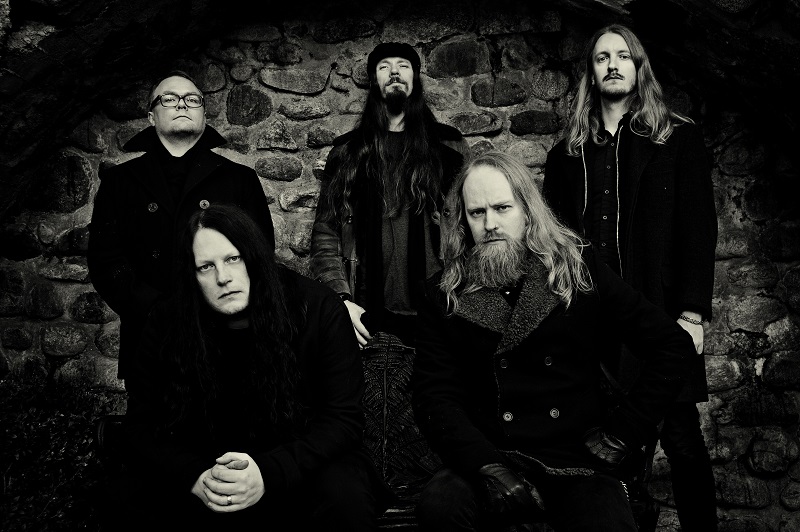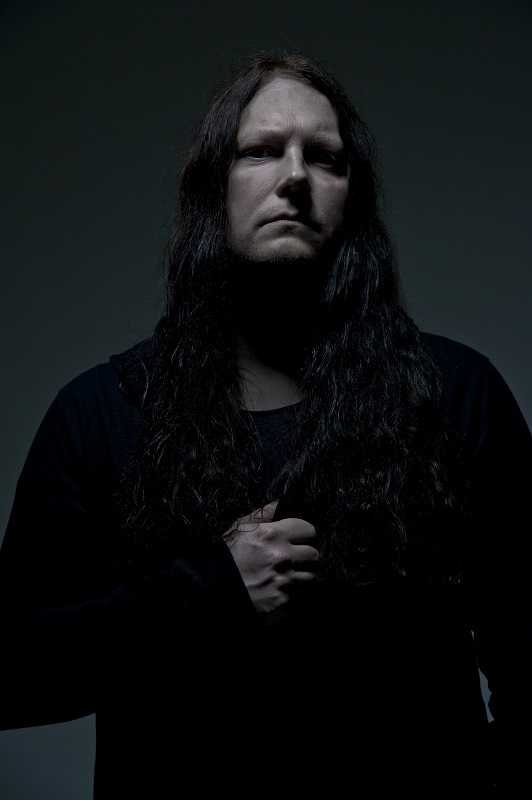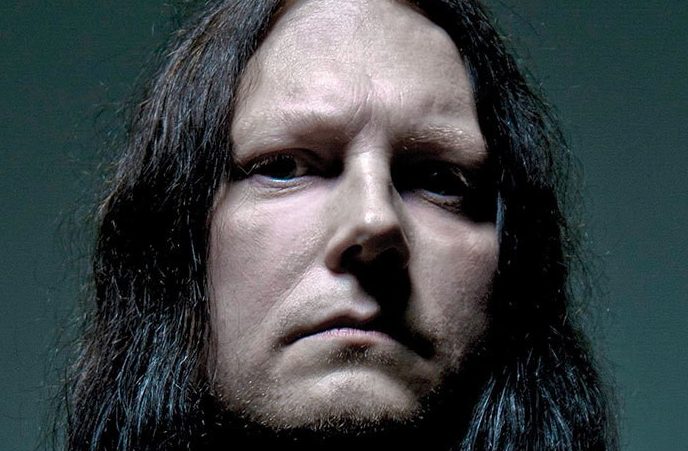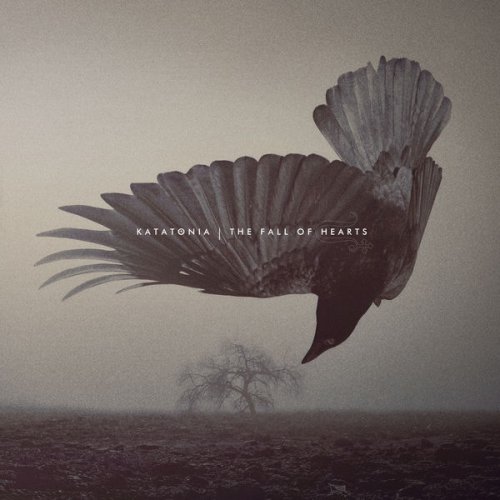Katatonia’s music is dark. Placing a lot of emphasis in the ambience created by their music, these Swedes have always put darkness as their main objective. With lyrics dealing with loss, pain, death and suffering, they have touched the lives of many, who have found a cathartic escape in their music.
When times are rough there is always music you can turn to.
Metal Blast: I know that it’ll be the same question that everyone will ask you this time around, but can you tell me about your upcoming album, The Fall of Hearts?
Jonas: I wanted a title that would describe the album as well as possible; it doesn’t really mean anything specific to me. It’s just a description of the album, the way I see what’s in there both musically and lyrically.
Musically, The Fall of Hearts is probably more varied and dynamic than anything we’ve ever done. We work very hard to raise the bar, and I think that with this album we managed to put in different stuff, from different influences, and still manage to make it sound like Katatonia.
This album is more diverse that some of our other works; it has some “light and shade.” It’s not just about repeating the dark stuff; it has moments of something else, and then going back to what we do best [laughs]
MB: Since you talk about not “repeating” the dark stuff; do you feel that you’ve made that “mistake” in other albums, that you repeat yourself too much?
Jonas: I wouldn’t call it a mistake. Obviously, we’ve done that stuff, and it’s something that I personally really like. I like repetitive music, but today, for Katatonia, we feel that we want to challenge ourselves and our listeners. We wanted to push the boundaries, so it’s not that we’ve made mistakes in the past; probably the albums that we’ve done couldn’t have been done in any other way at the time. Every album is an impression of where we are right then as people.
MB: You mention that The Fall of Hearts as a title also represents the lyrical content of the album. Do you feel that there’s a single theme going through the lyrics of the album?
Jonas: It’s not unique if you look at what I’ve written before [laughs]. The topics are pretty much the same although, of course, I always try to renew myself and not do the same. However, in this style of music you can only do so much in terms of renewing yourself, because the music is still pretty dark and sometimes depressing. It’s the kind of stuff that we’ve always wanted to do, and I always want the lyrics to go hand in hand with the music. Still, I’m trying to do different things, little nuances that, maybe, are different for me but not so much for the average reader of our lyrics.
MB: A few years ago, when we did another interview in the Netherlands, you mentioned that the content of your music creates a series of expectations in your audience that makes them also expect you to be a very depressed person. Why do you think people expect this from you, to the point of, as you said then, disliking you being happy?
Jonas: I think that’s because people take the music very seriously. Of course, that’s the way you should take the music, because it is serious music; at the same time, if I was really this depressed…. I mean, the album has 12 songs, it’s a bit over an hour. It doesn’t represent my life 24/7.
MB: You’d probably shoot yourself if it did.
Jonas: Exactly, I wouldn’t even be on tour if I felt like that all the time [laughs]
Of course, I was the same when I was younger in regards to the musicians that I looked up to. I’d have a picture in my mind of what I expected them to be like, and so if I had a chance to meet them and they didn’t fit it, I’d also be disappointed. Now that I’m a bit older I realize that, of course, you can’t represent an album 24/7. That’s just not possible.

MB: Well, it’s great that you have this creative outlet, because it shows that you’ve felt this way at some point, and I think that’s what makes your music so terrific.
Jonas: Thank you for that. Of course, doing this kind of music is also a proof that I’m probably not the most positive person in the world [laughs] But, of course, I’ll be happy sometimes. What you hear in the album is what you get, but if you meet me you’ll probably have something else. I think this goes for everyone that deals with depressing music, unless they’re only sitting at home and releasing an album per day.
MB: Do you feel that you are, or have been, a rather depressive person?
Jonas: Well, yes. I’ve dealt with it quite a bit throughout my life but, as you already said, the music is a great outlet. It lets you let off steam. If I didn’t have music I’d probably have to do something else to handle it, probably in a more destructive way, so for me it has been a very good thing to have. When times are rough there is always music you can turn to; either your own music or somebody else’s, and you can listen to it for comfort. It’s been really good for me.
MB: As a person who has also dealt with depression at some points of my life, I think that encountering this type of music helps you quite a bit. There’s a fairly cathartic feeling in realizing that it’s not just you who feels that way.
Jonas: Yes, that’s what I’ve always felt, even before I made music myself. It has been a natural thing since I started making music. For me to hear that people are getting some kind of comfort with my music is like paying back what I have gotten from other musicians. It’s a good thing.
MB: Although it’s been 4 years since the release of Dead End Kings, you’ve been pretty busy during that time. Dethroned & Uncrowned, Last Fair Day Gone Night and, of course, Sanctitute, a DVD showcasing your acoustic set, kept you pretty busy. Still, in terms of new material, it does represent a big lapse. Have the songs in The Fall of Hearts been written for a while, or were you just too busy?
Jonas: I think we were too busy to relax enough to create new material. We certainly had time off in between the stuff that we did but, to me and, I think, Anders [Nyström]… we need a certain calm to be able to sit back and focus on our music. I can’t really do it if I know that in 2 weeks we have to go on tour, and so in those two weeks I really can’t do music, because I think too much about the tour.
For Dead End Kings we did a lot of touring; we did 3 US tours, 2 European tours, we went to Australia and to several festivals… It’s kind of a handicap for me to be unable to use, for example, the two weeks I have on my hands and concentrate on doing music. As soon as I know that there’s something that I have to do in some time, I can’t really relax. It wasn’t until spring of last year that I was able to start collecting the ideas that I actually had and see if they could be fitted into songs. I think that we need some good time off to be able to concentrate on good material.
MB: Speaking of Anders; he said “we never considered Dethroned & Uncrowned to be our last album, but nevertheless that album also played a leading role in where we could potentially take our sound.” That kind of sounds like Katatonia was, or maybe is, thinking about a LAST album. Is that the case?
Jonas: Not really, but the difficulties that we have to sit down and work in new material when we’re busy have always been a hindering thing that prevents us from thinking about the future too much.
Dethroned and Uncrowned was so different for us to do… It was a project, an experiment, and the tour that followed it, the acoustic tour where we also did some stripped-down stuff from our whole career, was such an amazing experience that it made us look into our own music in new ways. If that had been the last thing we did as Katatonia, I would have been very happy, because it was a crowning moment. Starting off as a shitty death metal band, then going on for 20+ years, and finishing it off doing something really beautiful and different with our own material…
Still, we never said that this would be the last thing we ever did. We knew that we still had albums in us; all we need is the time and to be able to relax to think about what we will do next.

MB: Speaking at those early “shitty” death metal days. Do you actually look back at that heavier time of your musical history thinking that it wasn’t that good? How do you feel about that part of your band’s history?
Jonas: I look back at it with fond memories. When I think of it, it was what we needed to do at the time; it was perfect for us. That kind of music was what we listened to back then so, of course, we wanted to be part of it. It made us get that drive that you need to get your own sound. I don’t feel ashamed of it, it’s pretty much the opposite. We were very young at the time, so you have to take that into consideration.
MB: I only ask because you referred to it as a “shitty death metal band”!
Jonas: When we started, when we decided that we would have a band, we couldn’t even play our instruments. That’s where we come from. In the very beginning it was pretty much just noise, so when I compare that stuff with what we did in the Sanctitude DVD, on our Dethroned tour… they’re miles apart. It’s a good evidence that you can get somewhere even if you don’t have the right education in music or whatever [laughs]. We’ve learned everything by ourselves during our career. We’ve never had any music lessons or had anyone come in to tell us what we should do. In the big picture, it’s quite an achievement.
MB: When do you think you realized that the death/black metal of the beginning no longer represented your vision?
Jonas: I think that we realized it quite early. I believe that it was at the same time that we decided to go with clean vocals instead of growling, when we realized that with clean vocals you can add another dimension to the music. From the very beginning we’ve wanted to create atmospheric music; we never wanted to sound like Cannibal Corpse, even if we liked death metal. We wanted to have layers and atmospheres rather than blast beats.
To me the vocals are like another instrument; you can put a lot of reverb on them and they will sound like a choir. We wanted to go further, we didn’t want to stay as a doom, black, death metal or whatever, and from that moment we just naturally tried to challenge ourselves all the time. I know that this is a cliché answer, but it’s the way we looked at it. I think that when we did Discouraged Ones, our third album, that’s when we left the death metal thing and looked towards new horizons. We knew that it would be very difficult, but we were up for it.
MB:Listening to The Fall of Hearts I think that people will definitely hear some things reminiscent of Opeth’s latest works. You don’t sound the same, but definitely similar. Do you feel that you have been influenced by the same music? I know that you’re quite close with Mikael.
Jonas: Maybe. We’re very good friends, but we don’t share the exact same influences. He’s much more into really crazy proggy stuff. Because we’re the same age, and we sort of grew up together, we do have influences from the same eras of music, so if he’s listening to some really obscure prog band from the 70’s, I might like something from the same era, even if not the exact same band. I think that we have the same fundamental mutual influences, but we have different ways of achieving what we wanna do with our bands.
Opeth have always been more about being great musicians; they’ve always been practicing way more than we have ever done [laughs]. We’re still two very different bands, but I totally understand what you’re saying, because throughout both of our careers we’ve been quite alike, but different. We have sort of looked upon metal the same way and wanted to take it further; they have been maybe a bit more proggy while we were a bit more atmospheric, but you can still put us together in the same kind of fold.
Of course, when we see each other we listen to music together, and we do share a lot of stuff that we both like.
MB:… Does he only listen to music in vinyl? [laughs]
Jonas: If I’m at his place, it will only be on vinyl, yes.
MB: That must be annoying.
Jonas: It is! And the more you drink, it will get more and more sloppy the way he puts on the LPs. [laughs] The covers will be on the floor and stuff like that.
MB: I have vinyls of some bands that I really like, but it’s such a cumbersome way to listen to music. There’s a romantic part of it, but when you have to turn them around to listen to the second part it’s like… oh, fuck it.
Jonas: Exactly, it’s the same with me. I really like the format, because of nostalgic reasons, I still buy LPs, but I never listen to them. I don’t even have a record player. [laughs]
MB: [laughs] I can relate. I mean, it’s nice to have the big artwork and all that but… it’s a pain in the ass.
Jonas: Yes! [laughs]
MB: You know, even though, as we discussed, you’ve taken this softer sound, you still have a much heavier outlet, with your participation in Bloodbath. Last year I saw you perform in Wacken, and it was really incredible. How was that show for you?
Jonas: It was good! Wacken is where we did our debut with Bloodbath in, I think, 2005, so it was really nice to come back there, being much more comfortable. When we did our first show I had never played bass on stage, so I didn’t really know… [laughs] I mean, I had always been either the drummer or the singer before. This time it felt really nice. We had some gigs earlier on, so we felt quite confident with what we were doing.
It was also very special, because Dan Swanö joined us doing vocals in his song “Eaten.” He did two albums with Bloodbath before quitting the band, so it was good to get back to the old guys as well.
MB: How did you end up doing the bass here, considering that, as you’ve said, you’ve always done drums or vocals?
Jonas: Anders and I had the name Bloodbath for a long time before we even had the band. We always wondered why there were no death metal bands with that name, because it’s a perfect name. In early interviews we always said that we also had a death metal band called Bloodbath, but we never did anything with it until Dan Swanö, who had a studio and wanted to try out some new equipment, suggested we did something with Bloodbath. He wanted to play drums, so I said that I’d play the bass. He’s a great drummer, and I’m not.
MB: Were you a good bassist when you started?
Jonas: Uuuuuuggg…. not really, but I had been playing more bass than drums during the last few years, so it felt like a natural thing.
MB: Was it ever an option for you to take over the vocals?
Jonas: No, because we had already talked Mikael into it, and his voice is just perfect for death metal.
MB: He has a pretty good growl, yeah, but so did you at the beginning.
Jonas: In the beginning, yes, but then I sort of lost the ability to do it without ruining my throat, and since we were doing this clean vocals thing with Katatonia I didn’t want to risk doing anything stupid. Mikael was a great choice.
Originally it was just a project for the 4 of us to have fun; it was never intended to be a “real” band, but sometimes the ball starts rolling and you end up with something on your hands that you have to go with [laughs]
MB: The show at Wacken, considering the whole visual aspect of the band, was just amazing.
Jonas: We did live shows with Bloodbath in the past, we also did some shows with Mikael. He loved doing Bloodbath in the studio, but when it came to live shows he was like “… I don’t really want to do this, but I’ll do it.” When Mikael quit and we got Nick Holmes on board, I think that he was having a second death metal revelation in his life. Obviously he has been into death metal from the beginning, but then he drifted away with Paradise Lost and did some different things; but now he’s really coming back to it.
We decided to also look the part, and not just look like the old days, but maybe even exaggerate the look a little bit. I think that when people see a band named Bloodbath they don’t want five guys looking Rihanna on stage, so we also wanted to enhance that. Nick’s look is perfect for a morbid priest kind of… guy.
MB: I agree, and it was amazing!
Sadly, we are out of time, so thank you for everything today, and have a terrific day. I’m looking forward to, hopefully, seeing you on tour this year.
Jonas: Oh yeah. Thank you very much!



Heyy, I’m a crazy fan of the katatonia band! They great!
Thank you (i’d like to know your real name, but ok lol)very much and congratulations for the interview, you do write as a master!!! m/
I like you in podcast as well! You rules man!